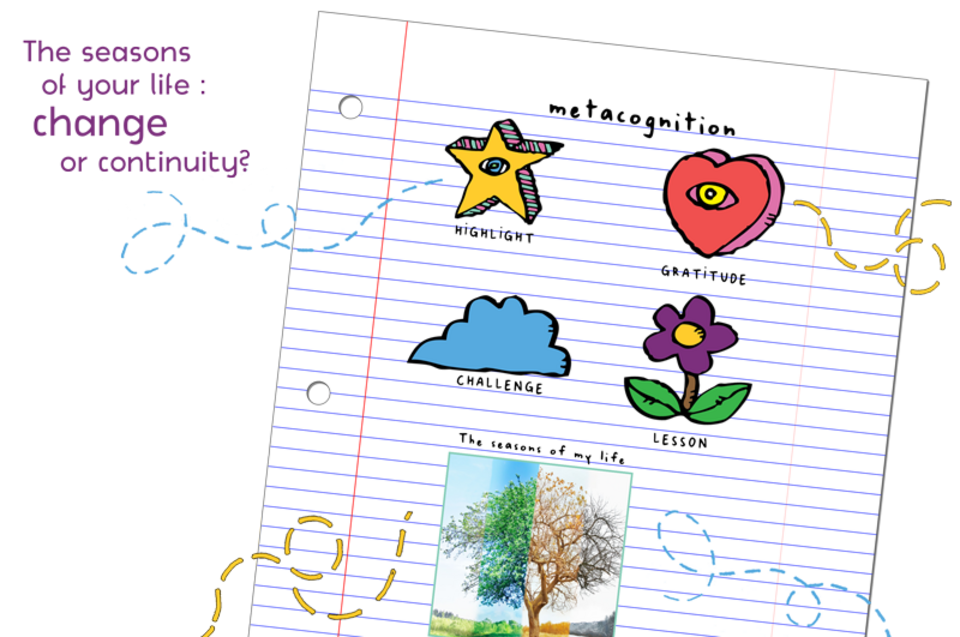
Cycle: change or continuity
| Objective: To reflect on your incredible Philoquester experience to identify its key moments! |
Duration: 10 to 20 minutes
Material:
- A sheet of paper
- Pencils, eraser
Instructions:
- Think back on today. Think about the different thinking and creative activities you completed today.
- Answer the following reflection questions:
- How did you live change today?
- What was your highlight today?
- What challenge did you face today?
- What lesson did you learn today?
- What is your gratitude today?
...
Bonus: Since the dawn of time, the seasons have come and gone. In most countries, summer, autumn, winter and spring follow one another year after year. It's a cycle: a series of events that repeat in the same order. This concept plays a very important role in many cultures’ worldviews, especially indigenous cultures. To better understand the concept of cycle, think about what the four seasons of your life might be. Maybe spring could represent the times when you start new things, summer could represent the times when you relax, fall could represent the times when things come to an end, and winter could represent the times when you slow down to think about what you have done and what you will do. Or maybe each season has its own specific emotions that you feel from time to time. Can you identify seasons in your life? Finally, ask yourself these questions: should we adjust our lives to the cycles of nature? Is it reassuring or depressing to think that life is partly made up of repeating cycles? Is a cycle a form of change or continuity? Or could it be both? |
Bonus plus: If you knew you were going to relive your life exactly the same way an infinite number of times, would you change anything about how you live? This is the thought experiment put to us by the German philosopher Friedrich Nietzsche through his concept of eternal return. He considers that most people would be horrified at the idea, because they don’t dare to live fully—accepting not only the tranquility and joys, but also the chaos and suffering of existence. Only the most courageous beings are capable of what he calls "amor fati," the complete acceptance of destiny and reality, which is the supreme form of life, according to him. What about you? Do you think we must strive to accept reality in its totality, without rejecting chaos and suffering? Would you be willing to relive your life exactly as it is an infinite number of times? What could this idea make you want to change in the way you live? |

| Tricks for tots: How does your life change with the seasons of the year? Depending on where you live, you might do very different activities in summer and in winter. Are there also things you do only in autumn or only in spring? To finish this philosophical quest, draw a picture of an activity you do in each season, making sure to show the current season for each activity. Do you have a favorite season? Would you like to live in a country where there are no seasons? Is it nice or unpleasant to know that things will change? Why is that? |
| Tips for teens: How has your understanding of change evolved over the course of this bewildering philosophical quest? Can you identify the specific experiences that have changed your view of change? Does the very fact of thinking about how your understanding of change has changed help you better understand this concept? You can use your answers to the questions above to reflect on your experience. |
Share your creative reflections by sending them via email.
Include photos of your projects and notes of your thoughts, as well as your first name and your age!

